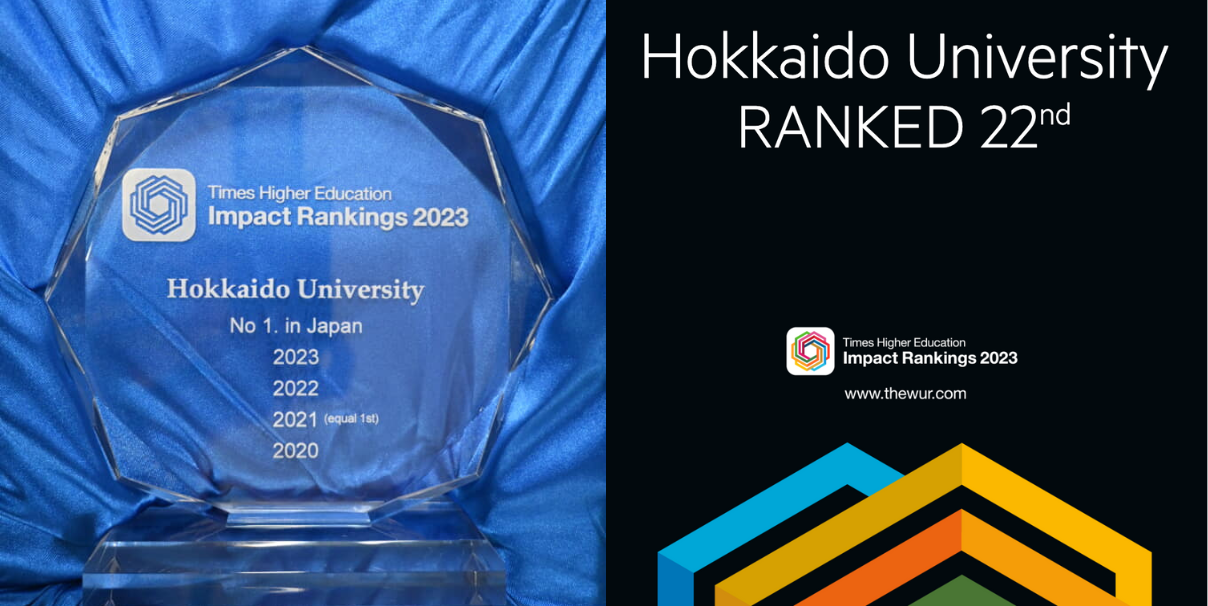President’s Column #3 – Education and Research as soft power
President's Column | August 30, 2023
Hokkaido University was ranked 10th in the world last year, and 22nd in the world this year, in the Times Higher Education (THE) Impact Rankings, which evaluate universities’ contribution to SDGs. In the domestic rankings, the University was ranked 1st for the fourth consecutive year.
On the other hand, it is ranked below 200th in the THE World University Rankings which focuses on research strength. Only two Japanese universities are ranked within the top 100. The news that no Japanese university is ranked within the top 10 in the world in terms of the number of papers published — a ranking that attracts worldwide attention — disappoints us.
National power is composed of hard power and soft power. In Japan, where natural resources are scarce and the population is shrinking, soft power is undoubtedly at the center of national power; within soft power, education and research are indispensable for Japan to compete with the rest of the world. Unfortunately, it must be acknowledged as a fact that Japan’s academic power, which is, so to speak, its lifeline, is on the decline. At the same time, however, we should not be indifferent to the mechanisms for properly promoting Japan’s research results to the rest of the world.
Freed from the spell of the Covid-19 pandemic, the wheels of “internationalization” have begun to turn rapidly. Looking only at the figures, it seems that “internationalization” has overcome the pandemic and is once again running faster than expected. There is no doubt that this is a great opportunity.
However, when it comes to internationalization of education and academia, the situation is not optimistic at all. This is because, as we can see from the history of diplomacy, Japan has never developed an elaborate autonomous diplomatic strategy. This seems to have continued unchanged before and after World War II.
In particular, education is one of the key pillars of a country’s international strategy. The internationalization of education in Europe and the United States is clearly positioned as a national strategy. The international strategy of education in Europe, especially in the UK, is outstanding, and the reputation management of UK universities, which rank high in the THE rankings, is based on their competence, leadership in international rule-making, and elaborate international strategy.
In Japan’s Ministry of Education, Culture, Sports, Science and Technology (MEXT), there is certainly an emphasis on the importance of education and academics as “soft power,” which is twinned with military and other hard power. Unfortunately, however, I cannot point to any international academic organization led by Japan or any educational evaluation system that has become a global standard.
Even now, with reference to the Research Excellence Framework (REF) in the UK, the introduction of “social impact” to Japan as a new method of university evaluation is being considered. In the evaluation of universities by social impact, educational ability, public service activities, and contributions to the local community are added significantly, replacing the conventional evaluation method that was heavily biased toward research. I welcome this new method; however, it is obvious that unless the characteristics of Japanese universities are fully taken into account, they will probably be regulated by new rules set by the US and Europe again.
What we are encountering in the aftermath of the Covid-19 pandemic is an era of new reconfigurations of the world order. International strategies that fully take into account various geopolitical risks are required in the deployment of soft power, such as education and research. The international deployment of Japanese universities as well as science and technology requires an elaborate vision that makes the best use of limited resources and maximizes their effectiveness.
Return to President’s Column Index


